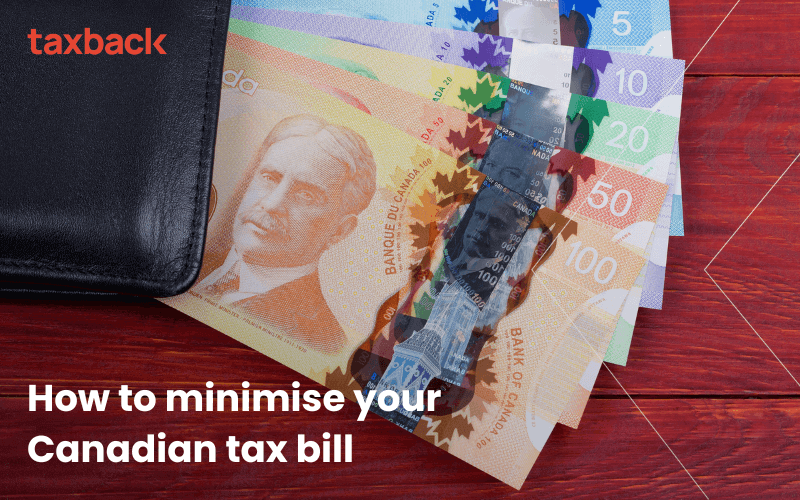Look, we get it.
Nobody likes filing tax returns!
But if you find yourself with a tax underpayment at the end of the tax year, it’s really important to file your Canadian tax return by 30 April.
If you miss the income tax return filing deadline, you may be hit with fines and penalties from the CRA – the Canadian tax authorities.
You may even jeopardize your future Canadian visa or residency applications.
Besides, it’s not all bad. There are a number of tax reliefs that non-residents in Canada can claim to reduce their tax bill.
And by the time you’re finished claiming all of your entitlements, you may even be due a tax refund!
So, with that in mind, we’ve put together this handy guide to everything you need to know to minimise your Canadian tax bill.
Table of Contents
Always make sure to claim your expenses
Many non-residents in Canada either forget or do not know they are entitled to claim tax relief on a whole range of expenses.
As a result, thousands of dollars get left behind with the tax man each year.
The truth is, if you earned an income over the tax free allowance (for 2024- $15,705 for income more than $173,205), you may be able to claim on the cost of certain expenses to reduce your overall tax liability.
However, you will always need relevant documentation for the expense you are claiming back on, so don’t forget to keep those receipts!
The Non-resident tax refund from Canada is $998

In order for an employment expense to be eligible, it must meet 2 conditions:
- Your employment contract requires you to pay the expenses
- You don’t receive an allowance to pay the costs or if you do receive an allowance, your employer adds it to your total income
Residents and non-resident
Some expenses are general and can apply to all taxpayers while others are territory specific. Territory specific credits and deductions can only be claimed by residents in Canada.
If you’re on a working holiday visa, you are not considered a resident.
What kind of general expenses count?
Canada tax – medical expenses
You can claim medical expenses that were either paid for by yourself, or your spouse, or common-law partner, or other certain related persons.
The total eligible medical expenses should be reduced by either 3% of your net income or $2,479, whichever is less. 15% is the tax credit applied to the amount remaining.
What medical expenses are deductible in Canada:
- Doctor consultants
- Nurses’ fees
- Prescriptions and medications
- Premiums paid to private health insurance
- Costs related to purchase of gluten-free food for coeliac
- Orthodontic work
Medical related travel
Did you have to travel at least 80 kilometres from your home for medical reasons? You can claim accommodation and meal expenses in addition to transportation expenses.
Disability support deduction
If you have a physical or mental impairment and have paid for certain medical expenses, you may be entitled to tax relief.
If you are eligible for this deduction, you may be able to deduct the expenses that you paid, so that you could:
- work
- go to school
- do research for which you received a grant
Unlike with medical expenses, only the person with the disability can claim expenses for this deduction.
Moving Expenses
Did you move from one region to another in Canada? You might be able to claim the expenses of this on your tax return!
You must have started a job or carried out business at your new location, and the new place must be at least 40km closer to your employment.
It is also applicable to you if you moved to full-time attendance in a post-secondary program at a university, college, or other educational institution. This new home must be at least 40km closer to your new work or school.
The average Canadian tax refund is $998
Business expenses
If you are self-employed in Canada, you may be able to claim a number of business expenses on your tax return.
In general, it’s possible to deduct any reasonable expense you incurred in order to earn your business income. However, personal expenses are not eligible.
Some common examples of business expenses include:
- Legal and accounting fees
- Telephone and utilities
- Travel
- Meals and entertainment
- Insurance
- Property taxes
- Motor vehicle expenses
Again, make sure you keep receipts in case you are the subject of an audit.
Tuition expenses
If you study in Canada, there are a range of eligible expenses you can claim as a tax credit.
A course would usually qualify for this if it was taken at the post-secondary level, or (for persons 16 years of age or older at the end of the year) if it develops or improves skills in an occupation. You must also have taken the course within the tax year you are applying for. When you pay tuition, you should be in receipt of a T2202, Tuition and Enrolment Certificate from the educational institution, and this is the form you will use to calculate your eligible tuition fee credit.
To qualify, the fees you paid to attend a Canadian educational institution must be more than $100.
These fees must be claimed on your return, even if a loved one paid them. However, fees of up to $5,000 can be transferred to your spouse, or common-law partner, or to your or your spouse’s or common-law partner’s parent or grandparent.
Donation expenses
Did you know that you can claim donations either you, or your spouse, or common-law partner made?
It’s true! All the eligible amounts of your donations to registered charities and other qualified donations made during the tax year, as well as any additional donations made from the previous five years that have gone unclaimed before, can be claimed on your Canadian tax return.
The average Canadian tax refund is $998
Interest paid on student loans
Under the Canada Student Loans Act, the Canada Student Financial Assistance Act, the Apprentice Loans Act, or similar provincial or territorial government laws for post-secondary education, you can claim loans.
Only you can claim an amount for the interest you, or a person related to you, paid on that loan within the tax year or the preceding five years.
Note that you will lose the right to claim interest paid on a student loan in case you combine it with another kind of loan.
The same applies if you renegotiated your student loan with a bank or financial institution or included it in the consolidation of your loans, the interest on the new loan does not qualify for this tax credit.
In addition, you cannot claim the interest you paid because of a judgment obtained after you failed to repay a student loan.
Annual union, professional, or like dues
Whether you are required to pay union dues depends on your governing labour code, your collective agreement, and your union.
Annual union dues can include the following amounts related to the employment that you paid (or that were paid for you and included in your income) in the year:
- annual dues for membership in a trade union or an association of public servants
- professions board dues required under provincial or territorial law
- professional or malpractice liability insurance premiums or professional membership dues required to keep a professional status recognized by law
- parity or advisory committee (or similar body) dues required under provincial or territorial law.
Note that the annual membership dues do not include initiation fees, licenses, special assessments, or charges for anything other than the organization’s ordinary operating costs. You cannot claim charges for pension plans as membership dues, even if the receipts show them as dues.
That’s just about everything you need to know about claiming back expenses on your Canadian tax return.
Personal Tax Credits
In Canada, there is a personal tax credit of $15,705 for 2024. This means if your net income is $173,205 or less you can earn up to this amount without paying any tax on it. However, if your net income from all sources exceeds $173,205 you may be entitled to partially claim this tax credit.
Your eligibility for personal tax credits is calculated on the form you fill when you start a new job in Canada – your TD1 form.
This is also where the 90% rule comes in.

The 90% Rule
This is another way of minimising your Canadian tax bill.
If you earned income from outside Canada but also earned income from Canadian sources in the same tax year of January – December, then you may not be entitled to claim the personal tax credits that allow you to earn tax-free income in Canada.
This is very relevant to a lot of working holidaymakers and students who work for a month or two in their home country before travelling to Canada.
In cases such as these, it is important to keep the 90% rule in mind.
This rule basically states that if you earned over 10% (net) of your income outside Canada, you are not able to avail of the personal tax credits. However, by earning 90% of your income within Canada, then you are able to claim the credits.
You should always factor this rule in when you’re filling in your TD1 form. If you earned less than 90% of your income in Canada during that tax year, you should enter 0 in box 13 and tick ‘No’ on the non-resident question on the form.
The average Canadian tax refund is $998
Confused about your tax return?
Wondering ‘How much tax refund will I get?‘
You’re not alone!
At Taxback, we help thousands of non-residents and students in Canada prepare their tax return and student tax return, and claim their refund.
When you apply with Taxback, we’ll ensure you claim every tax entitlement you’re due – reducing your tax bill (you may even be due a refund!).
And the best part?
We offer a completely stress-free, online service. We’ll handle all of the paperwork and ensure you are fully compliant with the CRA.
To get started, simply complete the short form here.
Last Updated on April 10, 2025







